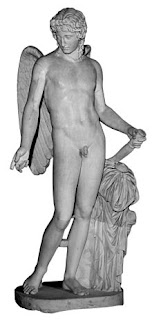Hay Fever
Allergic rhinitis, also known as hay fever, is a type of inflammation in the nose which occurs when the
immune system overreacts to allergens in the air. Signs and symptoms
include a runny or stuffy nose, sneezing, red, itchy, and watery eyes, and
swelling around the eyes. The fluid from the nose is usually clear. Symptom
onset is often within minutes following exposure and they can affect sleep, the
ability to work, and the ability to concentrate at school. Those whose symptoms
are due to pollen typically develop symptoms during specific times of the year.
Many people with allergic rhinitis also have asthma, allergic conjunctivitis,
or atopic dermatitis.
Eros
In Greek mythology, Eros was the Greek god
of sexual attraction. His Roman counterpart was Cupid ("desire").
Some myths make him a primordial god, while in other myths, he is the son of
Aphrodite. He was one of the winged love gods, Erotes
Helena
Helena, or Saint Helena, was a Greek native from the Greek city of Drepana (Δρέπανα) in
the province of Bithynia in Asia Minor. She became the consort of the future Roman Emperor Constantius Chlorus
(reigned 293–306) and the mother of the future Emperor
Constantine the Great (reigned 306–337). She ranks as an important
figure in the history of Christianity and of the world due to her major
influence on her son. In her final years, she made a religious tour of Syria
Palaestina and Jerusalem, during which she allegedly discovered the True Cross.
Pious beliefs also associate her to the foundation of the Vatican Gardens.
Theseus
Theseus was the
mythical king and founder-hero of Athens. Like Perseus, Cadmus, or
Heracles, Theseus battled and overcame foes that were identified with an archaic
religious and social order. In the same way that Heracles was the founding hero
for the Dorians, Theseus was a founding hero for the Athenians. The Athenians
regarded Theseus as a great reformer; his name comes from the same root as
θεσμός ("thesmos"), Greek for "The Gathering". The myths
surrounding Theseus—his journeys, exploits, and family—have provided material
for fiction throughout the ages.
Hippolyta
In Classical Greek mythology, Hippolyta was
the Amazonian queen who possessed a magical girdle that
was given to her by her father, Ares, the god of war. The girdle was a
waist belt that signified her authority as queen of the Amazons. She figures
prominently in the myths of both Heracles and Theseus. As such, the myths about
her are varied enough that they may be about several different women.
Greyhound Line
Greyhound Lines, Inc., usually shortened to
Greyhound, is an intercity bus common carrier serving
over 3,800 destinations across North America. The company's first route began in Hibbing, Minnesota in 1914, and
the company adopted the name The Greyhound Corporation in 1929. Since October
2007, Greyhound has been a subsidiary of British transportation company
FirstGroup, but continues to be based in Dallas, Texas, where it has been
headquartered since 1987. Greyhound and sister companies in FirstGroup America
are the largest motorcoach operators in the United States and Canada.
Pun
The pun, also called paronomasia,
is a form of word play that exploits multiple meanings
of a term, or of similar-sounding words, for an intended humorous or rhetorical
effect. These ambiguities can arise from the intentional use of
homophonic, homographic, metonymic, or figurative language. A pun differs from
a malapropism in that a malapropism is an incorrect variation on a correct
expression, while a pun involves expressions with multiple correct
interpretations. Puns may be regarded as in-jokes or idiomatic constructions,
as their usage and meaning are specific to a particular language and its
culture.
Puns have a long history in human writing. Sumerian cuneiform and Egyptian hieroglyphs were originally
based on punning systems, and the Roman playwright Plautus was famous for his
puns and word games. Punning has been credited
as the fundamental concept behind alphabets, writing, and even human
civilization.
The Tempest
The
Tempest is a play by William
Shakespeare, believed to have been written in 1610–11, and thought by
many critics to be the last
play that Shakespeare wrote alone. It is set on a remote island, where
the sorcerer Prospero, rightful Duke of Milan, plots to restore his daughter
Miranda to her rightful place using illusion and skilful manipulation. He
conjures up a storm, the eponymous tempest, to cause his usurping brother
Antonio and the complicit King Alonso of Naples to believe they are shipwrecked
and marooned on the island. There, his machinations bring about the revelation
of Antonio's lowly nature, the redemption of the King, and the marriage of
Miranda to Alonso's son, Ferdinand.






沒有留言:
張貼留言